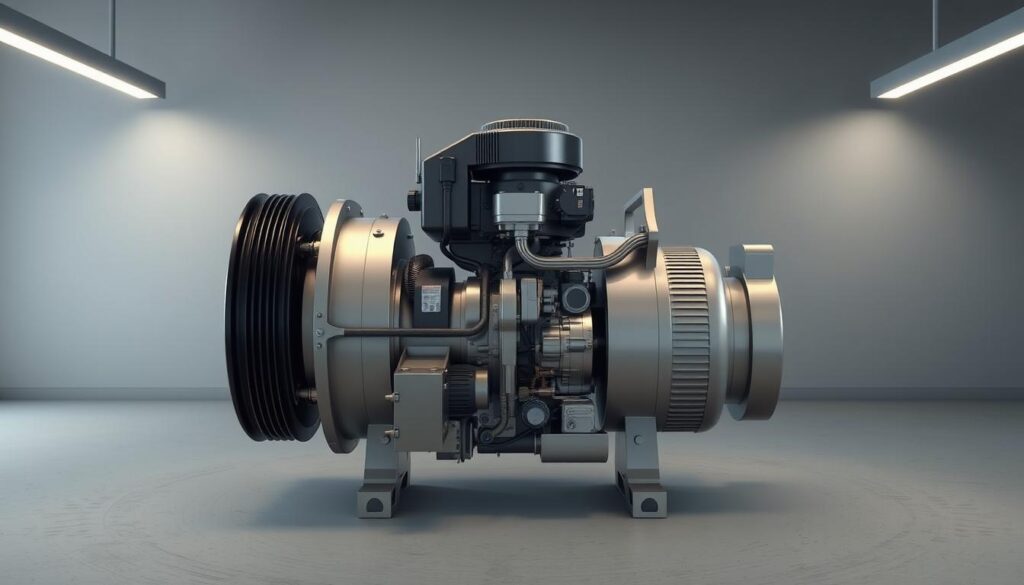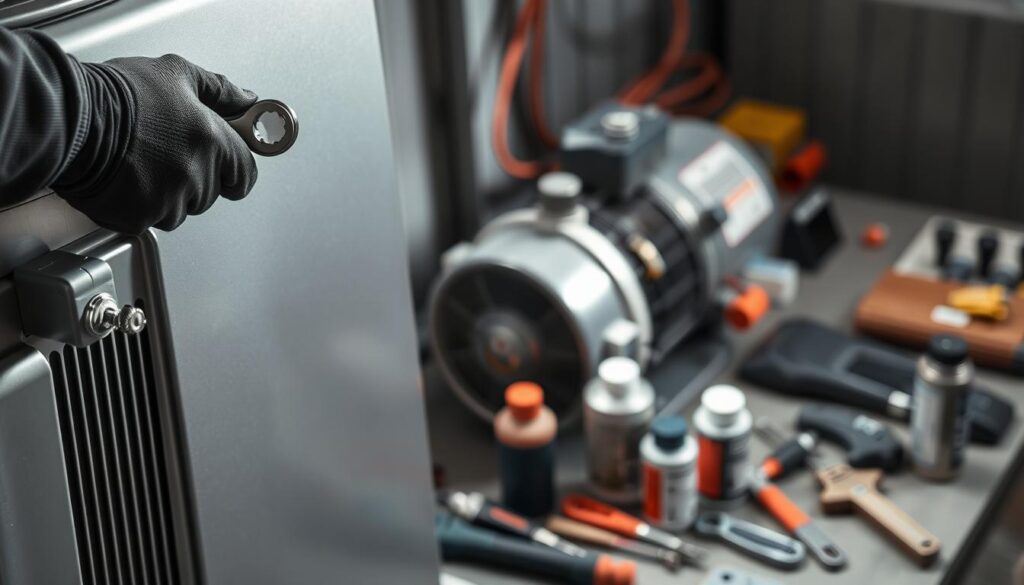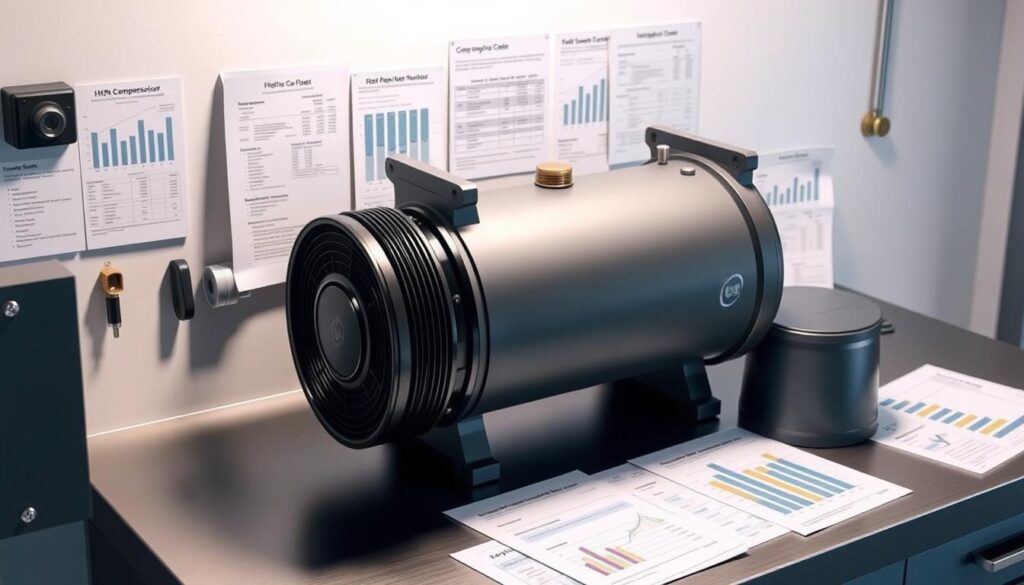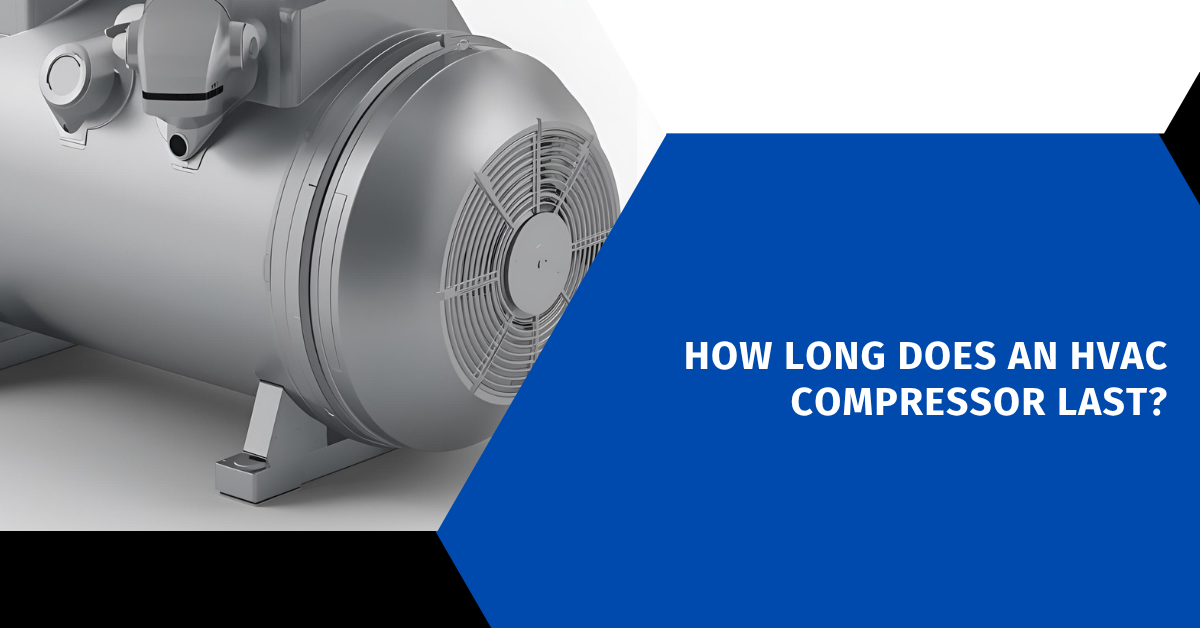Affiliate Disclosure
HVAC Guide Guys is a participant in the Amazon Services LLC Associates Program, an affiliate advertising program designed to provide a means for sites to earn advertising fees by advertising and linking to Amazon.
How Long Does an HVAC Compressor Last? Ever thought about how long your home’s cooling system lasts? Knowing the average lifespan of an AC compressor is key for comfort and saving money.

Your HVAC system’s compressor is the heart that keeps your home cool. Knowing how long it lasts can save you from expensive repairs and system failures.
With regular care, HVAC compressors can work well for 10-15 years. How long it lasts depends on many things. These include how well it was installed, how often it’s checked, and the weather where you live.
Key Takeaways
- HVAC compressors typically last 10-15 years
- Regular maintenance extends compressor life
- Climate significantly impacts compressor durability
- Professional inspections prevent unexpected breakdowns
- Quality installation reduces premature wear
Table of Contents
Understanding the Core Function of HVAC Compressors
Your home’s cooling system has many parts, with the compressor at its center. It’s key for keeping your home cool and efficient.
Compressors control your home’s temperature by moving heat. Knowing how they work shows why keeping them running well is important.
The Role of Refrigerant in Cooling Systems
Refrigerant is vital for cooling your home. It absorbs and releases heat in a cycle. This cycle includes several steps:
- Absorbing heat from indoor air
- Compressing and transforming the refrigerant
- Releasing heat outside the home
- Circulating cool air back into living spaces
How Compressors Remove Heat from Your Home
The compressor changes low-pressure refrigerant into high-pressure, high-temperature gas. This change is key for moving heat outside. It makes your home cooler.
| Compressor Function | Key Process | Temperature Impact |
|---|---|---|
| Heat Absorption | Refrigerant captures indoor heat | Reduces interior temperature |
| Compression | Increases refrigerant pressure | Prepares heat for external release |
| Heat Dissipation | Releases heat outside | Cools down indoor environment |
Components of a Modern HVAC System
A typical HVAC system has several parts that work together:
- Compressor
- Condenser coil
- Expansion valve
- Evaporator coil
- Refrigerant lines
Knowing these parts helps you keep your system running well. This ensures it works efficiently and lasts longer.
Explore Our HVAC Shop
Looking for top-rated HVAC tools, parts, and accessories? Visit our shop and find the perfect solution for your needs.
Visit the ShopAverage Lifespan of HVAC Compressors
Knowing when to replace your HVAC compressor is key for keeping your cooling system running well. Most HVAC compressors last between 10 to 15 years. This depends on several important factors.
When deciding if it’s time to replace your HVAC compressor, several things matter. The lifespan can change based on:
- Quality of initial installation
- Regular maintenance practices
- Environmental conditions
- How often you use the system
Experts say it’s smart to keep an eye on your compressor’s performance. High-quality units from trusted brands can last longer than 10-15 years with good care. It’s important to watch your system’s efficiency as it gets close to the decade mark.
“A well-maintained HVAC compressor is an investment in your home’s comfort and energy efficiency.” – HVAC Industry Expert
Your specific hvac compressor replacement timeline might be different. It depends on your local climate, how often you use it, and its maintenance history. Systems in milder climates might last longer. Units in harsh environments might need to be replaced sooner.
Signs that it might be time to replace your compressor include:
- Less cooling power
- Higher energy bills
- More repairs needed
- Strange noises when it’s running
Factors Affecting Compressor Durability
Your HVAC compressor’s lifespan depends on many important factors. Knowing these can help you keep your system running well for longer.
The life of your HVAC system’s compressor isn’t just luck. Several key elements greatly affect how long it will work well.
Climate and Environmental Challenges
Where you live greatly affects your compressor’s performance. Extreme weather and humidity can stress your system, shortening its life.
- Coastal regions with high salt content accelerate metal corrosion
- Desert climates cause increased dust and debris accumulation
- Humid areas promote moisture-related component damage
System Strain and Use Patterns
How you use your system every day affects its lifespan. Running it too much or changing the temperature often can damage it faster.
- Constant temperature changes increase mechanical stress
- Overworking the system during peak hours reduces efficiency
- Irregular maintenance accelerates component deterioration
Installation Quality Matters
Getting your system installed right is key to its longevity. A bad installation can cause early failure and expensive fixes.
Choosing skilled HVAC technicians is important. They ensure the right size, correct refrigerant, and optimal setup. These are vital for your compressor’s long life.
Explore Our HVAC Shop
Looking for top-rated HVAC tools, parts, and accessories? Visit our shop and find the perfect solution for your needs.
Visit the ShopHow Long Does an HVAC Compressor Last in Different Climate Zones
Your HVAC compressor’s lifespan changes a lot based on your climate zone. It’s important to think about how the environment affects your system’s performance.
Every region has its own challenges for HVAC systems. Things like temperature, humidity, and air quality play big roles. Places with very hot and humid weather are harder on compressors than areas with more moderate temperatures.
- Coastal Regions: Typically reduce compressor life by 2-3 years due to salt air corrosion
- Desert Areas: High temperatures accelerate wear and tear
- Humid Subtropical Zones: Increased moisture creates additional system strain
- Temperate Regions: Offer most favorable conditions for extended compressor longevity
Climate zones really affect how long your system lasts. Extreme weather means you might need to replace your compressor more often.
| Climate Zone | Average Compressor Lifespan | Key Stress Factors |
|---|---|---|
| Tropical/Humid | 10-12 years | High humidity, frequent operation |
| Arid/Desert | 8-10 years | Extreme heat, dust exposure |
| Moderate Temperate | 12-15 years | Balanced temperature, less strain |
| Coastal | 8-10 years | Salt air corrosion, moisture |
Keeping up with maintenance is key, no matter where you live. Regular checks by pros can help your compressor last longer and avoid sudden breakdowns.
Common Signs of Compressor Failure
Your HVAC system’s compressor is its heart. Knowing when it fails can save you from costly repairs or breakdowns. It’s key to keep your home comfy and protect your investment.
Spotting early signs can help fix compressor issues before they get worse. Here are the main signs your HVAC compressor might be failing:
Unusual Noises and Vibrations
Strange sounds from your HVAC system are never good. Look out for these specific sounds:
- Loud humming or buzzing sounds
- Grinding or rattling noises
- Persistent clicking before the system starts
- Excessive vibration during operation
Cooling Performance Issues
Your compressor is key to cooling your home. Failure signs often show in performance problems:
- Weak or inconsistent airflow
- Warm air blowing from vents
- Frequent cycling on and off
- Inability to reach desired temperature
Electrical Problems and Warning Signs
Electrical issues can signal compressor failure. Watch for these warning signs:
- Tripped circuit breakers
- Burning smells near the unit
- Intermittent power supply
- Visible damage to electrical connections
Pro tip: If you see many signs of compressor failure, it’s time to get a pro’s opinion. Catching these issues early can stop more damage and save you money on repairs.
Explore Our HVAC Shop
Looking for top-rated HVAC tools, parts, and accessories? Visit our shop and find the perfect solution for your needs.
Visit the ShopEssential Maintenance Tips for Extended Compressor Life

Keeping your HVAC system’s compressor in top shape is key. By following some simple maintenance tips, you can make your compressor last longer. This means fewer repairs and more savings for you.
Experts say there are a few important steps to take:
- Change air filters every 90 days to prevent system strain
- Keep outdoor unit clear of debris and vegetation
- Schedule annual professional inspections
- Monitor refrigerant levels regularly
- Address unusual sounds or performance issues promptly
Regular maintenance is more than just occasional checks. Consistent care prevents minor issues from escalating into major system failures. Clean air filters help your compressor work better, saving energy and money.
Getting regular professional service is also vital. Technicians can spot problems early and fix them before they cost a lot. They keep your system running smoothly and efficiently. This way, you avoid expensive repairs and keep your home comfortable.
“An ounce of prevention is worth a pound of cure” – this is very true for HVAC compressor maintenance
By following these tips, you’ll enjoy a cozy home and protect your investment in heating and cooling.
The Impact of Regular Professional Service
Keeping your home AC compressor in top shape is more than just routine upkeep. Professional help is key to making your compressor last longer and work better.
Regular visits from trained technicians are your best bet for a long-lasting AC compressor. They can spot problems early, saving you money and avoiding sudden breakdowns.
Importance of Annual Inspections
Getting your HVAC system checked once a year is essential. During these detailed inspections, experts do several important tasks:
- Comprehensive system performance evaluation
- Refrigerant level and pressure testing
- Electrical connection assessment
- Compressor component inspection
Professional Cleaning and Tuning
Professional cleaning is more than what you can do at home. Technicians use special tools to clean and fine-tune your system’s parts.
| Service Action | Benefit |
|---|---|
| Coil Cleaning | Improves energy efficiency by 10-15% |
| Lubrication | Reduces friction, prevents premature wear |
| Calibration | Ensures optimal system performance |
By choosing professional service, you’re not just keeping your AC running. You’re also safeguarding a big investment and ensuring comfort for years ahead.
When to Repair vs. Replace Your Compressor
Deciding whether to repair or replace your HVAC compressor can be tough. The decision depends on several important factors that homeowners need to think about carefully.
Your HVAC system’s performance and age are key in deciding when to replace the compressor. Experts say it’s time to replace when repair costs get close to half the price of a new unit.
- Age of the compressor (typically 10-15 years)
- Frequency of recent repairs
- Overall system efficiency
- Energy consumption patterns
Important factors to consider include:
| Repair Indicator | Replacement Recommendation |
|---|---|
| Minor component failure | System over 10 years old |
| Occasional maintenance issues | Repeated expensive repairs |
| Minimal efficiency loss | Significant performance decline |
Pro tip: Consult a professional HVAC technician to perform a thorough system check before making a decision.
Money matters a lot. While repairs might seem cheaper at first, an old compressor can cost more in the long run. It can also lead to unexpected breakdowns.
Explore Our HVAC Shop
Looking for top-rated HVAC tools, parts, and accessories? Visit our shop and find the perfect solution for your needs.
Visit the ShopCost Considerations for Compressor Replacement
Replacing an HVAC compressor is a big deal for homeowners. Knowing the costs helps you decide on your central air compressor’s future.

The timeline for replacing an HVAC compressor has several financial aspects. Homeowners need to look at both short-term and long-term costs.
Breakdown of Replacement Expenses
- Typical compressor cost range: $1,200 – $2,500
- Labor expenses: $500 – $1,500
- Additional system component replacements: $300 – $800
Energy Efficiency Benefits
New compressors save a lot of money over time. They can cut energy use by up to 40%. This means big savings on your bills.
“Investing in an efficient HVAC system is not an expense, but a strategic financial decision for your home’s comfort and value.” – HVAC Industry Expert
Several things affect how much you’ll pay for a new compressor:
- System age
- Current equipment condition
- Home size and cooling needs
- Regional climate
Even though the initial cost is high, new compressors are more efficient. They offer better performance and save you money in the long run.
Protecting Your Compressor from Environmental Damage
Environmental factors greatly affect how long your compressor lasts. They also play a big role in your HVAC system’s lifespan. To keep your compressor safe, you need a good plan and regular upkeep.
Different places have their own challenges for HVAC systems. Places near the coast, hot deserts, and polluted cities can make your compressor wear out faster. Knowing these risks helps you take steps to protect your compressor.
- Install protective covers for outdoor units
- Create proper clearance around the compressor
- Use weatherproof enclosures in harsh climates
- Regular cleaning to remove debris and contaminants
Where you put your compressor is very important. Keeping it away from the sun, water, and debris can help it last longer. Here are some important steps to take:
- Elevate the outdoor unit to prevent water damage
- Install wind barriers in storm-prone regions
- Use corrosion-resistance coatings for coastal environments
Professional maintenance is the best way to protect your HVAC compressor from damage. Getting your system checked every year can spot problems early. This can save you from expensive repairs or having to replace it too soon.
Explore Our HVAC Shop
Looking for top-rated HVAC tools, parts, and accessories? Visit our shop and find the perfect solution for your needs.
Visit the ShopThe Role of Proper System Installation
Your central air compressor’s life starts with one key thing: professional installation. Skilled technicians are essential for your HVAC system to work well and last long.
When you install your HVAC, many things can affect how long it lasts. If it’s not done right, your system might not work as well and could break down sooner. Experts know how to set up complex HVAC systems correctly.
- Correct equipment sizing for your specific space
- Precise refrigerant charge measurements
- Proper ductwork configuration
- Accurate electrical connections
Trying to install it yourself or hiring someone who’s not qualified can be risky. These errors can make your compressor work too hard, leading to:
- Higher energy bills
- Poor cooling
- System failure
Even though professional installation costs more at first, it saves you money in the long run. It avoids expensive fixes and early replacements.
“A correctly installed HVAC system is the foundation of reliable home comfort.” – HVAC Industry Expert
Remember: Quality installation is your first line of defense in protecting your central air compressor’s durability.
Conclusion
Knowing how long an HVAC compressor lasts is key for homeowners. It helps keep your cooling system running well. The lifespan of your home ac compressor depends on many things.
These include regular maintenance, the quality of installation, and the environment around it.
Getting your HVAC system checked by pros regularly can make it last longer. Annual inspections and fixing problems early are important. Also, choosing a good installation can keep your compressor working great for years.
Most HVAC compressors work well for 10-15 years with the right care. Knowing how to take care of your system helps you make smart choices. This includes when to fix or replace it.
A well-kept HVAC system keeps your home comfy and saves money in the long run. Learn about your system and work with trusted HVAC experts. This way, your home stays cool and comfy.

